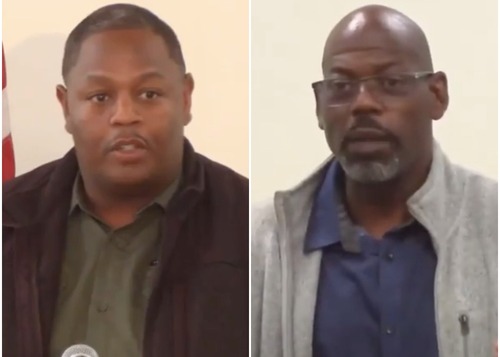
Robert Olive and Bryan Ferguson are a well-financed super PAC's picks for the Board of Police Commissioners.
Money from a political action committee whose donors include Republicans is being steered toward two candidates running for seats on Detroit’s police oversight board, part of an ongoing trend of big money influence in this and past local election cycles. One candidate has a lengthy criminal record and was briefly put on probation just last year, while the other is distinguished in part by the fact that he tentatively supports the department's use of facial recognition technology, whereas the majority of board hopefuls do not.
In 2017 and 2018, the Powering the Economy super PAC run and funded primarily by the Detroit Regional Chamber drew donations from, among others, the campaign of Detroit Mayor Mike Duggan; executives with Blue Cross Blue Shield; and Lena Epstein, a Bloomfield Township Republican who co-chaired ex-President Donald Trump's Michigan campaign and went on to mount a failed bid for Congress.
After being funneled through a smaller super PAC called Detroit Forward Together in 2018 for a separate race, up to $20,000 of the chamber PAC's money is now being used for mailers and social media ads for Board of Police Commission candidates Bryan Ferguson in District 1 and Robert Olive in District 7. The two are running in all write-in races and were among about a quarter of commission candidates who did not respond to a Deadline Detroit questionnaire seeking their positions despite numerous reminders via phone, text and email.
A spokesman for Detroit Forward Together says they’re the best people for the job, but those who the money is working against believe its ultimate goal is to weaken the Board of Police Commissioners by installing candidates less likely to hold the department to account.
This is the state of electoral politics in Detroit, where money from politicos, c-suites and business interest groups whose leaders live outside the city is used to influence outcomes for residents, nearly 80 percent of whom are Black. Often, stewards of the funds don’t explain their motives.
Olive is a minister affiliated with the Church of the Messiah who says he wants to serve as a voice for Detroiters with criminal backgrounds. The 37-year-old has spent much of his adult life in prison with a total of 24 criminal offenses dating back to 2002, including domestic violence, felony firearms, assault, retail fraud and larceny, a Michigan Department of Corrections spokesman said.
Since his release in 2016, he’s been arrested several times, including for absconding from parole and failing to return a rental car last year in Macomb County. For that, he pleaded no contest and was put on probation and ordered to pay restitution.
Olive is opposed in his race by Ricardo Moore, a former Detroit police lieutenant and commissioner who served from 2013 to 2017 and was a thorn in the side of ex-Chief James Craig. Christopher Currie, whose LinkedIn shows he's an office management assistant with the police department, also recently joined the race.
Ferguson, meanwhile, is the former head of the Schoolcraft Improvement Association and a member of the Grandmont Rosedale Development Corporation’s crime prevention task force. He was the only candidate in a recent forum to decline to share his position on the police department’s use of facial recognition technology, saying he doesn’t “know enough.”
All of the other board prospects at the forum were opposed to the surveillance tool that has led to the wrongful arrests of at least two Black men and subsequent lawsuits against the city. Tamara Smith, Joshua Engle and Clement Lett are running against Ferguson in the all write-in race that includes no incumbents.
Neither Ferguson nor Olive immediately responded to requests for comment for this article. Reached by phone Friday, Ferguson asked for questions in writing and said our candidate guide went to his spam folder. He did not respond when we provided those questions.
Detroit board of police commission candidates asked how they would vote if facial recognition came before them today, after two mis-IDs led to wrongful arrests and lawsuits against the city: pic.twitter.com/2Bze66k1DO
— violet ikonomova (@violetikon) October 19, 2021
Detroit Mayor Mike Duggan has said there are at least two dozen 501c4 nonprofits, political action committees, and other groups involved in Detroit’s municipal elections this cycle and “some of them are supporting issues I support, some are supporting ones I don’t.” He has not endorsed any candidates in the commission races.
One such group, run by his close allies, is backing city council and commission candidates who’ve been criticized as rubber stamps of his and former police chief Craig’s agenda. Our Neighborhoods First, a nonprofit that does not disclose its donors, is sending mailers for Willie Bell in District 4 and Lisa Carter in District 6, incumbents who've rotated the board’s chairperson position in recent years. It's also sending mailers for incumbent Linda Bernard in District 2.
Another group, affiliated with the Democratic Socialists of America’s Greater Detroit Chapter, is backing political newcomer Landis Spencer for District 6, who advocates reallocating some police funds to address causes of crime such as mental illness. The political action committee is funded primarily by small-dollar donations from individuals, about three-quarters of whom list addresses outside Detroit, according to a donor list it voluntarily shared ahead of a campaign finance filing deadline.
The board has long been accused by citizen watchdogs and a minority faction of commissioners of failing to fulfill its oversight role. Earlier this month, Free Press columnist Nancy Kaffer wrote that it has grown “increasingly dysfunctional, a body whose endless meetings yield little in the way of meaningful oversight or constructive reform,” pointing to issues including the failure to hire for key positions and disciplinary recommendations that go ignored by the department. In 2019, its power was called into question when it emerged the department had been using facial recognition technology for 18 months without its approval.
‘Sounds discriminatory’
Does the Detroit Regional Chamber care about the make up of the board? It too is not endorsing anyone in the commission races, but declined to say whether it supports its money being used in them.
“We encourage Detroiters to thoroughly research all candidates for this important office,” said Powering the Economy treasurer Brad Williams, the chamber’s vice president of government relations.
The super PAC gave Detroit Forward Together $62,000 in 2018 to boost pro-business candidates against a crop of community activists in races for Detroit’s Charter Revision Commission. Detroit Forward Together spent about $40,000 that election cycle. Williams said Powering The Economy has not given additional funding since.
Detroit Forward Together treasurer Dennis Denno, a Democrat who property records indicate lives in East Lansing, declined to say why he’s concerned with the commission and backing a candidate who tentatively supports a technology that has been known to disproportionately misidentify people with darker skin.
“I’m not talking about that, but thank you for the call,” he said Wednesday.
Asked on Friday whether he still also worked for state Sen. Betty Jean Alexander, Denno referred us to Mario Morrow, who said he was the super PAC’s spokesman. Morrow separately mounted a campaign earlier this year to defeat the charter revision proposal on the grounds that its anti-poverty reforms would prove too costly.
“We believe those are the best candidates to fill those seats,” Morrow said of the police commission, pointing to Ferguson’s community development background and Olive’s help in distributing 23,000 meals per week during the pandemic.
Asked if he was aware of Olive’s lengthy criminal background, he responded “I believe in second chances.”
Asked whether he believes in 25th chances, he said “I believe in God and forgiveness.”
Morrow declined to identify all of the PAC's operators and what their interests may be in the board, but said he and Denno are involved in decision making.
When asked if Denno still lives outside of the city, Morrow responded, “That’s a dangerous assumption you just made about non-Detroiters. Sounds discriminatory ... I know a whole lot of people who are non-Detroit residents who are involved in Detroit politics.”
Hidden agenda
The opposing candidates have their own thoughts on what’s driving the big money toward their competitors.
“The only thing I can think of is that Mike Duggan remembers the energy that I brought to the board,” said Moore. “He definitely remembers the energy I fought with and the checks and balances I brought of holding Craig accountable.
“It’s just unfortunate that the citizens really don’t know and they might just go for the okey doke.”
Duggan’s office said it would be “inappropriate and irresponsible” to link his campaign’s $3,000 contribution to Powering the Economy in 2017 to work being conducted by a group using its money in 2021.
Moore and Smith have both raised and spent less than $1,000 on their respective races, they said. Smith, a former city council candidate and life coach, said she wanted to send out mailers but couldn’t afford to.
“The powers that be want it to stay the powers that be and not have someone who truly cares to fight for the people or who solidly understands what the community wants,” she said. “It’s not something they care to hear.”
The $1.1M Powering The Economy super PAC, established in 2014, is essentially a cash vehicle for various groups working on behalf of candidates and causes the chamber views as pro-business. Donors to such PACs may have similar goals or simply be part of “an alliance of convenience,” said Michigan Campaign Finance Network executive director Simon D. Schuster.
“A super PAC just exists to move money, there’s no insight into its motives,” he said, adding that operators can raise unlimited sums from corporations, unions, and individuals so long as they don’t contribute to or coordinate directly with parties or candidates.
Powering the Economy has donated to PACs and dark money nonprofits associated with a number of causes in and outside of Detroit.
In the city, it has given to:
- Detroit Jobs First, a dark money nonprofit helmed by current and former mayoral appointees that helped defeat a 2016 grassroots community benefits ordinance that would have required significant concessions from developers.
- The Detroit Progress Fund, Duggan’s mayoral nonprofit that voluntarily discloses its donors but not expenditures, whose spokesman is also Morrow.
- One Detroit For All Of Us, a dark money group incorporated by Duggan’s campaign attorney whose leadership roster includes Duggan’s deputy chief of staff, Elisa Malile.
- Detroit Neighborhoods First, a super PAC that counts Dennis Archer Jr. among its donors and Morrow among recipients of its funds.
Outside the city, it has donated to dozens of groups including:
- Healthy and Productive Michigan, a PAC run by ex-Michigan Republican Party vice chairman Scott Greenlee that unsuccessfully fought a 2018 ballot initiative that legalized recreational marijuana use in the state.
- Citizens for Accountable Government, a nonprofit reportedly led by a group of Republican former state reps whose causes included bringing about a policy change in Rochester Hills that resulted in a lucrative trash hauling contract for Rizzo Environmental Services. Rizzo’s founder was later sentenced to five years in prison after admitting he bribed a Clinton Township trustee with $50,000 for help with a separate garbage contract.
- Michigan Citizens for Financial Responsibility, a nonprofit reportedly led by current and former GOP consultants Steve Linder and Bob LaBrant that reportedly gave $660,000 to Unlock Michigan, a group that tried to limit Gov. Gretchen Whitmer's emergency powers during the pandemic.
► Support our reporting by becoming a Deadline Detroit member for as little as $3 per month.


 by
by








